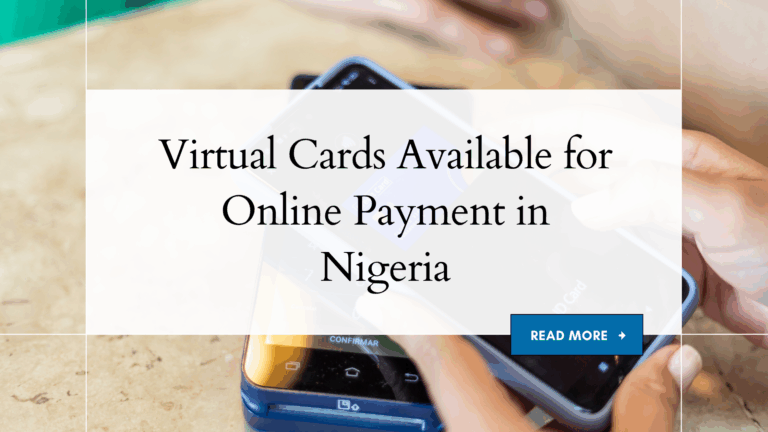The past decade plus has seen massive growth in online payments in Nigeria, fueled by the rise of e-commerce platforms, mobile banking, fintech apps, and international subscriptions. Services like Netflix, Amazon, Spotify, and even Facebook Ads require seamless and secure online payment methods—something traditional banking services in Nigeria have often struggled to support, especially for foreign transactions.
With this growth in online transactions has come significant risks which result in international card usage restrictions and forex limitations. Virtual cards have emerged as a significant solution to these challenges for Nigerians. They offer the same functionality as physical debit or credit cards but exist entirely in digital form, providing better security, control, and convenience.
This article explores the best virtual card options available in Nigeria, comparing features, fees, limitations, and use cases to help you find the right option for your online financial needs.
What Is a Virtual Card?
A virtual card is a digitally generated payment card used primarily for online transactions. Like physical cards, they come with a 16-digit number, CVV, and expiry date, but they exist only on your phone or computer. Many are tied to fintech wallets or bank apps, offering easy issuance and management. Most virtual cards should be available for online payment
Benefits include:
-
Improved security (no risk of physical theft)
-
Disposable or limited-use features
-
International payment access
-
Easy funding via local bank transfers or debit cards
An instance of the use of Virtual cards: You can create a disposable virtual card for a one-time purchase on Amazon, then delete it for security.
Some Virtual Cards Available for Online Payment in Nigeria
1. ALAT by Wema Bank
- Offers both Naira and Dollar virtual cards
- No issuance or monthly fee for Dollar card
- Ideal for Netflix, Facebook Ads, Canva, and Amazon
2. Kuda Bank
- Provides a virtual Naira Visa card
- Free for the first card
- Great for local platforms like Showmax and Spotify
3. Eversend
- Offers dollar virtual cards for global payments
- $1 creation + $1 monthly fee
- Supports international transactions for freelancers
4. Opay
- Offers virtual Naira cards for online payments
- Accepted by over 1,000 merchants
- No maintenance fees
5. Other Reliable Options
| Provider | Setup Fee | Currency | Notable Feature |
|---|---|---|---|
| Cardtonic | $1.50 | USD | No monthly fee |
| Vesti | Free | USD | Global acceptance |
| Grey | $4 (with $1 rebate) | USD | Low FX fees |
| GeePay | $3 | Multi | Supports USD, GBP, EUR |
What You Should Consider Before Choosing a Virtual Card Provider
- Currency Support: Choose USD for international platforms
- Funding Methods: Bank transfer, debit card, or wallet top-up
- Fees: Issuance, maintenance, FX markup
- Spending Limits: Some cards restrict daily or monthly usage
- Accepted Platforms: Ensure the card works for Netflix, PayPal, etc.
- Customer Support: Check for active service channels
Potential Challenges with Using Virtual Cards in Nigeria
- CBN restrictions limit international transactions on Naira cards
- Service shutdowns like Flutterwave’s Barter in 2022 disrupted users
- Forex scarcity sometimes affects card funding
What Does The Future of Virtual Cards in Nigeria Look Like?
As Nigeria’s fintech ecosystem grows, we can expect:
- More multi-currency card options
- Better mobile app experiences
- Flexible cards tailored to freelancers, SMEs, and remote workers
Conclusion
Whether you’re a student, entrepreneur, or remote worker, virtual cards help you shop online, subscribe globally, and get paid internationally.
Some Picks for Virtual Cards in Nigeria:
| Card | Best For | Type |
|---|---|---|
| ALAT | Ads & SaaS subscriptions | USD |
| Kuda | Local streaming services | Naira |
| Eversend | Freelancers & digital nomads | USD |
| Chipper Cash | General international use | USD |
| Vesti/Grey | Low-cost multi-currency | USD |
Tip: Always confirm card functionality and terms before making major payments.
Related Post:



